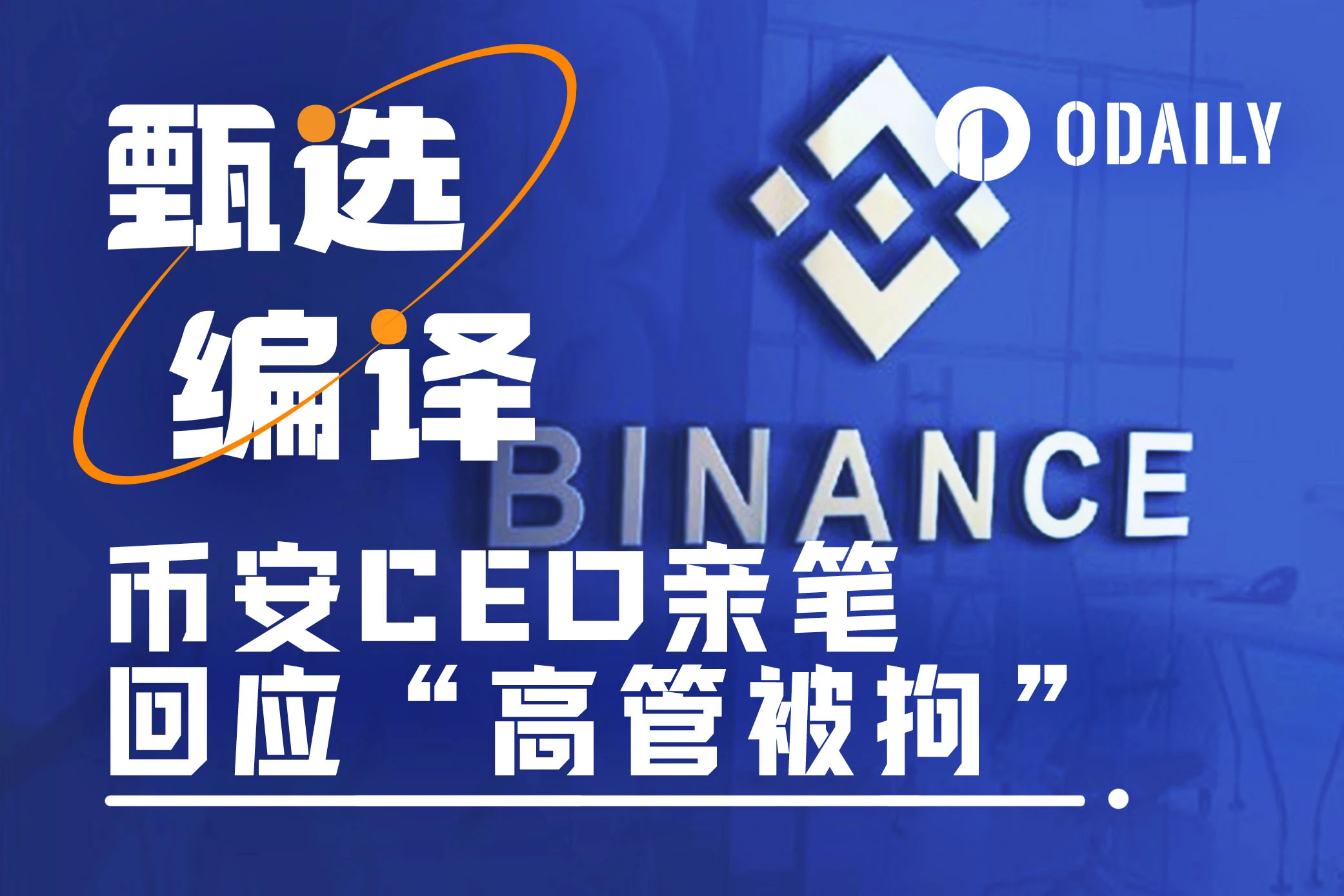Binance CEOs personal article: The ins and outs of the executive detention incident
Original author: Richard Teng
Compiled by: Odaily Planet Daily Azuma

As you know, one of our colleagues, Tigran Gambaryan, has been detained by Nigerian authorities for more than 70 days. This has generated a lot of public commentary, and I want to take this opportunity to set the record straight to prevent public perception of this matter from being unfairly distorted. I also feel it is important to speak on behalf of global business organizations – inviting employees of a company to attend a meeting on the pretext of assisting in policy development, only to detain them, sets a dangerous precedent for all global companies.
First, I want to introduce Tigran, who I have gotten to know better and have a growing admiration for since I joined Binance. However, it is extremely ironic and unfortunate that this top global financial crime fighter, widely acclaimed in both the private and public sectors, has been detained in Nigeria for more than two months on some far-fetched grounds.
Tigran has spent his entire career fighting financial crime. Tigran’s decade as a federal police officer is chronicled in the book Trackers in the Dark: The Global Operation to Hunt Down a Cryptocurrency Crime Leader, and we published a blog a few weeks ago further sharing his outstanding crime-fighting achievements.
After leaving his post as a special case officer at the IRS, Tigran joined Binance to continue his work. Tigran realized that working for the largest company in the emerging cryptocurrency industry would be more effective in combating bad actors and maintaining the health of the market. Anyone who has moved from public service to the private sector can tell you that sometimes working for a private company with huge scale can have a greater positive impact.
Based on this background, Tigran was hired by Binance in 2021 to help us establish and strengthen compliance matters such as law enforcement cooperation and preventing financial crimes. As the head of Binances financial crime compliance team, Tigran has been a staunch advocate for Binance to formulate policies and maintain compliance, and his work has set new standards for the industry. During 2022 and 2023, Tigrans team assisted global law enforcement agencies in freezing and seizing assets worth more than $2.2 billion, including more than $285 million in funds frozen in cooperation with the FBI, Department of Justice, Drug Enforcement Administration and other agencies.
Finally, it is worth noting that Tigran did not go to Nigeria as a “decision maker” or “negotiator”, he only participated in the discussion as an expert in financial crime and policy making.
Nigeria’s local regulatory background
I thought it would be helpful to revisit some of the stories that helped to reconstruct the history of our activities in Nigeria. Actually, this story began nearly two years ago.
2022-2023
In May 2022, the Nigerian Securities and Exchange Commission (hereinafter referred to as SEC) issued regulations on digital assets, bringing cryptocurrencies under its regulatory scope. The regulations require cryptocurrency exchanges operating in Nigeria to obtain SEC licenses and comply with certain requirements. However , these regulations fail to clearly spell out some key licensing requirements (such as application procedures, licensing fees, etc.), which actually makes applying for a license impossible.
Binance proactively contacted the SEC several times, seeking practical guidance on the licensing process and proposing a consultative exchange with the Nigerian authorities.
For example, in a letter dated June 22, 2022, Binance stated: “We welcome and appreciate the opportunity to work with the SEC and other industry participants in the Blockchain Alliance to provide further clarity on the application of the new rules in the coming days, particularly the Central Bank of Nigeria’s position on the rules, the fee structure for registration, and the impact of registration on the facilitation of bank accounts in the region.”
However, Binance has never received any response from the SEC. To our knowledge, no virtual asset service provider (VASP) has been licensed under the new regulatory framework to date.
Nearly a year later, on June 9, 2023, the SEC published a notice on its website warning the Nigerian public about the activities of the Binance exchange and instructing Binance to immediately stop attracting Nigerian investors. The notice stated: Binance Nigeria Limited is not registered or regulated by the Commission and its operations in Nigeria are therefore illegal…By this notice, Binance Nigeria Limited is hereby directed to immediately cease any form of solicitation of Nigerian investors.
The mention of “Binance Nigeria Limited” in the notice is incorrect. Binance Nigeria Limited has nothing to do with Binance, but was registered by a third party, probably for the purpose of arbitrage gains when Binance builds local services in Nigeria. However, it is clear that the SEC is targeting Binance itself.
Realizing that the SEC was sending this notice to the real Binance, Binance immediately suspended its solicitation activities in Nigeria, including paid advertising, SEO, online and offline activities, and all communications to users. These restrictions are still in place to this day.
In the letter we sent to the SEC at the time, we reiterated that Binance was “fully committed to cooperating with the Commission and complying with relevant regulations” and requested a meeting with the SEC (note that Binance had previously requested a meeting but had not received a response from the SEC).
As always, the SEC did not respond. We could only attempt to continue to engage constructively with the SEC and provided our feedback on its revised rule on March 29, 2024.
In August 2023, we decided to engage through the Nigerian digital asset industry. We began supporting the Digital Currency Coalition (DCC), an industry association of local and foreign digital asset service providers in Nigeria that aims to advance regulatory discussions and improve cryptocurrency regulations.
In November 2023, we did something in Nigeria that we have done with law enforcement agencies around the world: Binance conducted law enforcement training for the Nigeria Financial Intelligence Unit (NFIU) and the Economic and Financial Crimes Commission (EFCC). These efforts have not only increased the effectiveness of cryptocurrency-related crime-fighting efforts around the world, but have also served as an important relationship-building tool for the Tigran team to work more closely with law enforcement agencies.
In early December 2023, Binance received a letter from the Chair of the House Financial Crimes Committee requesting that we appear at a public investigative hearing in less than two weeks.
2024
Ultimately, through informal channels, we reached an agreement with the Committee to reschedule the hearing to January 10, 2024 to allow us ample time to prepare and send a delegation of Binance employees who are aware of the important issues at stake.
Tigran Gambaryan and several other members of our team traveled to Nigeria to attend this and other related meetings. On January 5, Binance employees met with the Nigeria Financial Intelligence Unit (NFIU) to discuss information sharing and ongoing capacity building. The consensus reached by both parties in the discussion is that the next step for the NFIU to share a Memorandum of Understanding (MoU) outlining the proposed terms and conditions for sharing AML-related information.
On January 8, Binance employees held a face-to-face meeting with three members of the House of Representatives Committee on Financial Crimes (HCFC) and a clerk at the House of Representatives Building in Abuja, which was scheduled for private preliminary engagement. The meeting was chaired by Peter Akpanke, Philip Agbese and Peter Aniekwe, and a clerk.
During the meeting, the committee stressed the importance of the issues discussed and their readiness to prosecute Binance, including issuing arrest warrants for our team and CEO, and prohibiting our team from leaving the country. While the situation is concerning, we understand that the HCFC does not actually have the power to issue arrest warrants.
The Commission confirmed that a public hearing will take place on January 10, and Binance will have the opportunity to publicly respond to any allegations in the presence of the complainant, the media, and more than 30 institutions.
Despite multiple requests, Binance has not received detailed information about the allegations, so our staff asked if they would have the opportunity to submit their responses in writing without a public hearing. This was done for a number of reasons, including the potential sensitivity of the information and the fact that our staff could prepare a more substantive response after reviewing the full allegations. At the end of the meeting, the Chair confirmed that they would consider the matter and respond through Binances local counsel.
However, as our staff were leaving the meeting, they were approached by unknown individuals who suggested that they pay a fee to settle the charges. Later that day, our local lawyer – who was representing us at the time – was summoned by the Committee through an individual claiming to be its agent, who conveyed the Committee’s conditions and directed our lawyer to advise us. The lawyer responded that he had received a request for a secret payment of a large amount of cryptocurrency within 48 hours to resolve the issues and that we needed to make a decision in the morning. Our team grew increasingly concerned about their safety in Nigeria and left immediately. Of course, we rejected the payment request through our lawyer as we did not consider it a legitimate settlement offer and clarified that we would only participate in settlement negotiations if the following conditions were met:
-
Binance needs to see the details of the complaint and/or all allegations;
-
The settlement must be official, documented in writing, and signed by all parties involved;
-
The settlement must involve all relevant entities and ensure a full resolution of all allegations (including, if applicable, any potential liability for historical tax liabilities).
-
While the specific terms of the settlement may need to remain confidential, there must be some public statement acknowledging that a resolution was reached.
-
There should be no public hearings before the committee’s discussion;
-
Our contractors and employees should not be intimidated, harassed or detained.
Our lawyer conveyed Binances conditions, which were initially opposed. However, our lawyer informed us that the committee eventually agreed to the above conditions.
Shortly after returning from this trip, the NFIU shared a draft MoU outlining Binance’s commitment to voluntarily submit suspicious activity reports (SARs) and suspicious transaction reports (STRs), provide training to law enforcement agencies in Nigeria and elsewhere, and a commitment to mutual cooperation between the two parties. We view this as a positive development in the collaborative effort to make cryptocurrencies safer and free from criminal activity.
On February 5th, a Binance consultant with strong local connections suggested that we meet with the Director of the Office of the National Security Advisor (ONSA). This Director will become Binance’s central point of contact in Nigeria. Again, we see this as a positive development because instead of having to deal with multiple agencies/departments one by one, we will be able to communicate centrally through a very senior and respected figure in the Nigerian law enforcement community.
In early February, our team discussed the possibility of a meeting with ONSA and the Nigerian Economic and Financial Crime Commission (EFCC). In an email, we outlined the key role we play in global law enforcement efforts. We work with law enforcement agencies around the world to conduct investigations and provide support when necessary. In particular, we have established a strong and productive working relationship with our counterparts in Nigeria, including the EFCC. The meeting agenda proposed by Binance includes:
-
An introduction to Binance and our global operations and compliance procedures.
-
Binance’s current cooperation with the EFCC and the Financial Intelligence Unit.
-
Outline the cooperation with the SEC, the good faith steps Binance has taken to comply with the SEC’s directive, and ONSA’s assistance in charting future directions.
-
HCFC and ONSA recommendations for the meeting.
-
To enhance our strategy to work with ONSA and strengthen our relationship.
The meeting has been scheduled for 2pm on February 26, 2024, at the ONSA office in Abuja. It is confirmed that the following government representatives will attend the meeting: the National Security Adviser, the Chief Executive Officer of the SEC, and the Deputy Governor of the Central Bank of Nigeria (CBN).
Despite the obvious risks, Tigran Gambaryan and Nadeem Anjarwalla (Head of Binance Africa) received multiple assurances of safe passage so that they could safely attend these meetings.
Concerns about Naira devaluation and P2P services
During this period, Nigeria’s official currency, the Naira (NGN), experienced a dramatic devaluation, with some observers calling the current situation the worst financial crisis in generations. While many cryptocurrency platforms operated in Nigeria and continue to operate to this day, Binance was the dominant cryptocurrency platform in the region at the time, with Nigerian traders using the P2P offering on Binance to hedge against currency devaluation. We began to notice concerns that merchant prices on P2P platforms were affecting the country’s foreign exchange rates.
The Binance P2P team reached out to the local community and learned that due to the lack of an official reference FX price in Nigeria, Nigerians (cryptocurrency users or not) were using average prices from P2P ads as a reference source for FX rates.
While the advertised quotes in the P2P market are real-time and fluctuate with the market, they are not always a true reflection of the actual transaction price. Binance does not participate in the setting of P2P prices. In fact, P2P trading is completely dominated by individuals who can directly buy and sell specific cryptocurrency or fiat currency trading pairs. This is essentially a cryptocurrency market.
P2P products do not have the same level of usage, market depth, and liquidity as centralized exchanges. Due to lower liquidity and higher volatility, people may see spikes in quotes in the P2P market, which do not necessarily represent the actual asset price, and the quotes may not necessarily translate into actual transactions. Some in the local Nigerian community believe that these price fluctuations may be price manipulation, and given that merchants widely use P2P advertised prices as a reference for foreign exchange rates, some people believe that Binance is one of the factors in the countrys foreign exchange rate and currency depreciation fluctuations.
Of course, the factors affecting foreign exchange rates are complex and are mainly driven by macroeconomic policies.
-
Cato Institute: Nigerias Government Is Blaming Binance for Its Own Mismanagement
-
Applied Economics Professor Hanke: Nigerian Governments Crypto Claims Are Misguided and Incorrect
At the same time, our P2P team continued to push for several measures, including removing ads for abnormal pricing, imposing restrictions on the relevant users, and individually controlling buy and sell limits. We also planned to add a last traded price display so that the market no longer considers the peak of the quote as the market price. Below are a few blogs we published at the time, making it clear that we are committed to providing users with a market-driven, fraud-free, and manipulation-free platform. We take our responsibility to protect users very seriously. To emphasize this point, we made it clear that if users behavior is malicious or manipulative, they will be expelled from the platform.
What happened at that meeting?
On February 26, Tigran and Nadeem travelled to Nigeria for the scheduled meetings, where they received multiple security assurances as previously stated. In the first meeting, they met with the leaders of ONSA, the Office of the President, the Central Bank, NFIU, EFCC and the SEC.
The atmosphere of the meeting was neutral, neither friendly nor hostile. Overall, the meeting lasted about two hours and made some progress.
One of the EFCC leaders who had established contact with Tigran over the past few months called them aside and told them that everything was going well and that Tigran and Nadeem had nothing to worry about. Binance employees were then informed that another meeting would be held soon, this time involving the top leaders of ONSA, CBN, SEC, and the Ministry of Communications, Innovation and Digital Economy.
After waiting for more than two hours, Binance employees were re-invited to the meeting room, but the attendees were different from the previously announced list — specifically, four EFCC members were present.
At the second meeting, the other team leader showed a hostile attitude. He said that the issues involving Binance were related to national security and made the following demands:
-
Remove the Naira from the Binance platform (this is the first time Nigerian authorities have explicitly made this request to Binance);
-
Provide details of all Nigerian users;
-
Provide financial/tax compliance information;
They further explained that until Binance meets these demands, Tigran and Nadeem will become their “guests” and be housed in a “high-security” residence for “security reasons.” In addition, they also demanded that Tigran and Nadeem hand over their passports.
After the meeting, Tigran and Nadeem were escorted back to their hotel, told to pack their bags, and moved to a “safe house” controlled by ONSA. Their phones were confiscated, and they were explicitly told not to leave. Tigran and Nadeem no longer had control over who they talked to and when.
From this point on, Tigran, a US citizen, and Nadeem, a British/Kenyan citizen, were detained. In the first hours of detention, both the British High Commission and the US Embassy were informed of Tigran and Nadeems situation.
The next day, Binance’s legal counsel emailed ONSA’s leadership, asking them to “urgently clarify the legal basis for the detention of their employees,” noting that their respective countries’ embassies (the United States and the United Kingdom) had been notified. Our note further stated: “We understand that based on our conversation with you yesterday, your primary concern is the Naira as a tradable asset on the Binance platform. This is the first time we have been informed of issues regarding the Naira and that we can remove the Naira from the Binance platform. However, we request that you ensure that Tigran and Nadeem are released immediately and that no restrictions are imposed on their movements, including their movement out of Nigeria.”
ONSA responded via email the same day, saying Tigran and Nadim were their “guests” and were being “warmly entertained.”
We subsequently received confirmation that the US and UK governments were aware of the situation and were following up closely.
Over the next 24 hours, Tigran and Nadeem came under intense scrutiny as they were accused of being personally responsible for the state of the naira and the economy in general, and faced charges of terrorism financing and money laundering.
On February 28, we removed Naira trading pairs from our website and shut down P2P products for Nigeria on Binance. We informed ONSA of our actions via email and requested that Tigran and Nadeem be immediately facilitated to “safely travel to the airport.”
That day, we received no official response from ONSA.
On the same day, the same EFCC leader who had established ties with Tigran in the past few months broke down and apologized to Tigran, saying it was his fault because he had assured Tigran and Nadeem that everything would be fine and the meeting was supposed to be amicable.
Soon after, news of Tigran and Nadeems detention broke in global media. Almost a month later, on March 23, we learned that Nadeem had been released from illegal detention. Since then, Tigrans situation has gone from bad to worse.
What is the current situation?
During Tigran Gambaryan’s bail hearing on April 25, prosecutors from the Economic and Financial Crimes Commission (EFCC) told the court: “Since the first defendant (Binance) is a virtual operation, the only person we can rely on is this defendant (Tigran).”
The Nigerian government’s intentions are clear: they must take control of Binance by detaining an innocent former U.S. federal employee and putting him in a dangerous prison.
Since I became CEO of Binance, I have been committed to working with global regulators and law enforcement to protect the integrity of the global financial system.
Over the past two and a half years, Binance has worked hard to adjust our organizational structure and personnel and upgrade our systems. We have brought in new leadership with extensive compliance experience and outstanding backgrounds from top traditional financial institutions, leading technology companies, law enforcement agencies, and major corporate entities.
Today, the Binance leadership team, including myself, reports to the Board of Directors. The Board of Directors, as corporate regulators, is responsible for protecting the interests of the company and making key decisions to ensure the long-term sustainability and life cycle of the business. It is through this process that we become stronger, more secure, more compliant, and provide a safer platform for our users. Our business has undergone tremendous changes.
This ordeal has been deeply painful for Tigran, his family and friends, and the entire Binance community. As mentioned previously, in order to dispel any doubts about our role in the country’s currency crisis, I made the difficult decision earlier this month to shut down Binance’s P2P products for the Nigerian market and terminate spot trading for all naira pairings. We took this drastic step in the hope that our colleague would be released and that Binance would continue to work with the Nigerian government to resolve outstanding issues. Unfortunately, this did not happen as expected.
We will continue to support Tigran in every possible way and this support is unbreakable.
Bring Tigran home, and Binance will voluntarily work with law enforcement in Nigeria, as it has done over 600 times before. We will always want to protect innocent users and not allow bad actors to be on our platform. We will work tirelessly with public and private partners to remove bad actors. Additionally, we will continue to work with the Nigerian Federal Revenue Service to resolve any historical tax issues that may exist.
I still don’t understand why Nigerian government officials are unwilling to accept this solution. The Nigerian government holds extraordinary power to determine the future of Binance and the broader crypto industry within its jurisdiction. Binance hopes to build a future that works side by side with the Nigerian government to build a strong economy for the Nigerian people. But this crisis must be resolved quickly, and Tigran must be allowed to return home if we are to move forward.
Binance remains committed to innovative ways to leverage digital assets and platforms, but we must also build a future where we are the good actors in the global community that we see ourselves as.
I want to express my deepest gratitude for the many supports we have received from around the world during this crisis and hope that my next update will tell you that our employees are safely home and reunited with their families.
This article is sourced from the internet: Binance CEOs personal article: The ins and outs of the executive detention incident
Related: Polygon (MATIC) Price Forecast: Holding $1 Support or Lower?
In Brief MATIC price nearly fell through the $1 support last week before recovering by 9%. Polygon investors are pulling away from participating on-chain due to hesitation. The altcoin has also lost the traction it held among new investors, resulting in a network growth slowdown. The Polygon (MATIC) price managed to bring itself back above the $1 mark this week after nearly closing a daily candlestick below it. However, despite the bounce back, the altcoin did not manage to revive the investors’ interest, which might cause another decline. Polygon Investors Are Taking a Break Polygon investors play a huge role in impacting the direction of the MATIC price, and these holders are taking a turn for the worse. Following the recent correction and the more recent scare of the altcoin…






